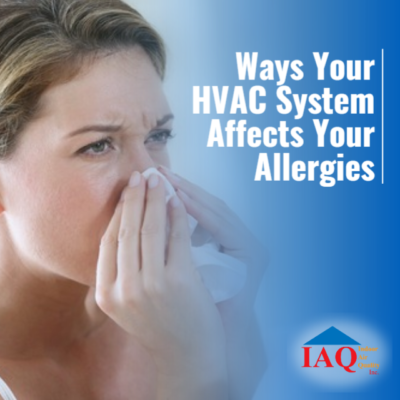Blog
5 Ways Your HVAC System Affects Your Allergies
 Homeowners, you may be surprised to learn that your indoor air quality may be far worse than the outdoor air quality. That is, in part, because our well-sealed homes can keep contaminants such as dust and pollen trapped inside and allow them to accumulate. Your HVAC system is an important ally in combating this problem and helping to reduce the impact of allergens in your home.
Homeowners, you may be surprised to learn that your indoor air quality may be far worse than the outdoor air quality. That is, in part, because our well-sealed homes can keep contaminants such as dust and pollen trapped inside and allow them to accumulate. Your HVAC system is an important ally in combating this problem and helping to reduce the impact of allergens in your home.
Your HVAC moves air throughout your home
Your HVAC system heats and cools your home by moving air. Because many allergens are airborne, they can travel from outside to inside your home fairly easily through windows, doors and other openings. They can also be drawn into your home through the HVAC system itself and circulated throughout. You can reduce this problem with regular whole home cleaning and by keeping pollinating plants away from the outside unit of your HVAC system.
Allergens can build up in your ductwork
Allergens can make their way into your living spaces and compromise your indoor air quality when they build up in the ductwork. To keep these types of pollutants out of your home, make sure your ducts are well sealed. If allergies are a big problem, you might consider getting your air ducts professionally cleaned.
Filters can remove particles from the air
One of the simplest and most effective ways to keep unwanted allergens and other debris from circulating throughout your home is by regularly changing the filter in your HVAC system. Most manufacturers recommend replacing the filter every one to three months depending on how quickly it accumulates dirt. This protects your HVAC as well. The MERV rating is used to measure how well a filter removes fine particles from the air. The higher the rating, the more particles the filter traps. That said, a filter with a very high rating may not be good for your system either, as it can restrict air flow. For best results, consult the manufacturer or your HVAC technician.
HVAC can aid ventilation
The “V” in HVAC stands for ventilation and this is an important function when it comes to reducing the impact of allergens in your home. Household chemicals such as cleaning products can trigger allergy symptoms and your system’s ventilation can decrease the accumulation of these irritants and reduce their impact.
HVAC can prevent the spread of allergens in your home
Your HVAC system is a major component in preventing the spread of allergens in your home, but it must be properly maintained to be effective. In addition to regularly replacing the air filter, be sure to schedule annual professional maintenance to keep your system clean and performing well.




